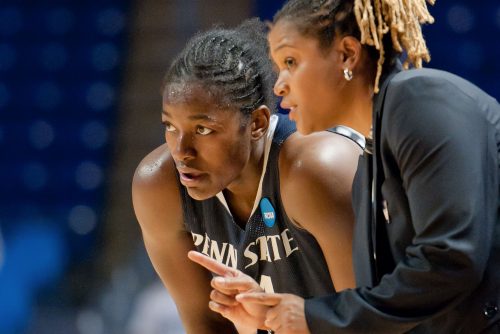Practice for college athletes is going to look a little different on November 2 this year. They’ll be doing drills — but not the athletic kind.
On election day, NCAA athletes and their coaches are taking a day off of sports and making it a day on for civic engagement.
Why All Vote No Play?
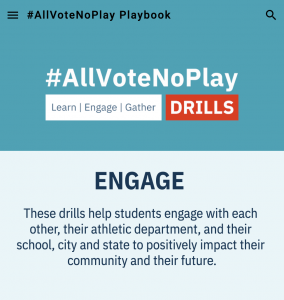
The #AllVoteNoPlay Playbook has “civic drills” your coaches can use to strengthen your civic muscles and practice living like a citizen.
This NCAA-mandated #AllVoteNoPlay day of action is a historic moment. Coaches are using election day to support their athletes as they grow into passionate leaders, engaged citizens, and community members.
Just picture it: athletes across the nation strengthening their civic muscles by registering their peers to vote. Reckoning with moral tensions in American history. Strengthening relationships with civic leaders in the community. This is true citizenship like!
While 75% of student athletes want more civic opportunities with their teammates, many coaches are dragging their feet.
Is your coach on board? If not, it’s time for you to supercharge your civic power and be the one to bring #AllVoteNoPlay to your team. Here at Citizen University, we equip civic catalysts like you with the ideas, tools, and support to build power for good.
#1 Get literate in power.
The first step is knowing how power works and operates.
Many people don’t like to talk about power. It can feel overwhelming or like something that good people shouldn’t wish for. But power is neutral, like fire or physics.
Simply put, power is the capacity to have others do as you would want them to do. And when we pair power with a strong sense of civic character — a commitment to the common good — that’s what true citizenship is.
Watch the video below to learn about the six sources of power.
What did you learn that will help you build power for making #AllVoteNoPlay day a reality with your team? Maybe it’s the social norms — what people think is OK. You have the power to change the narrative around what is valuable to you and your teammates. Or maybe it’s source number six: numbers. How might you collaborate with other teams at your school to show your unified desire for more space and time for civic activity?
Learning about power helps us feel more hopeful, clear, and prepared to act. It helps us find purpose and belonging, by taking responsibility for our community and working with others to make things work better for more people.
Extra credit: check out Eric Liu’s book, You’re More Powerful Than You Think, for more lessons on power→
#2 Map where power flows.
After learning how power operates, we need to understand who holds power currently — and how they feel about the issue at hand.
Enter: power mapping. This strategy, using a simple X/Y chart, can show us who we need to influence and how to move them. This resource from Beautiful Trouble lays it out.
Step 1. Draw out two axes. The X axis moves from strongly disagree to strongly agree. The Y axis moves from less powerful to more powerful.
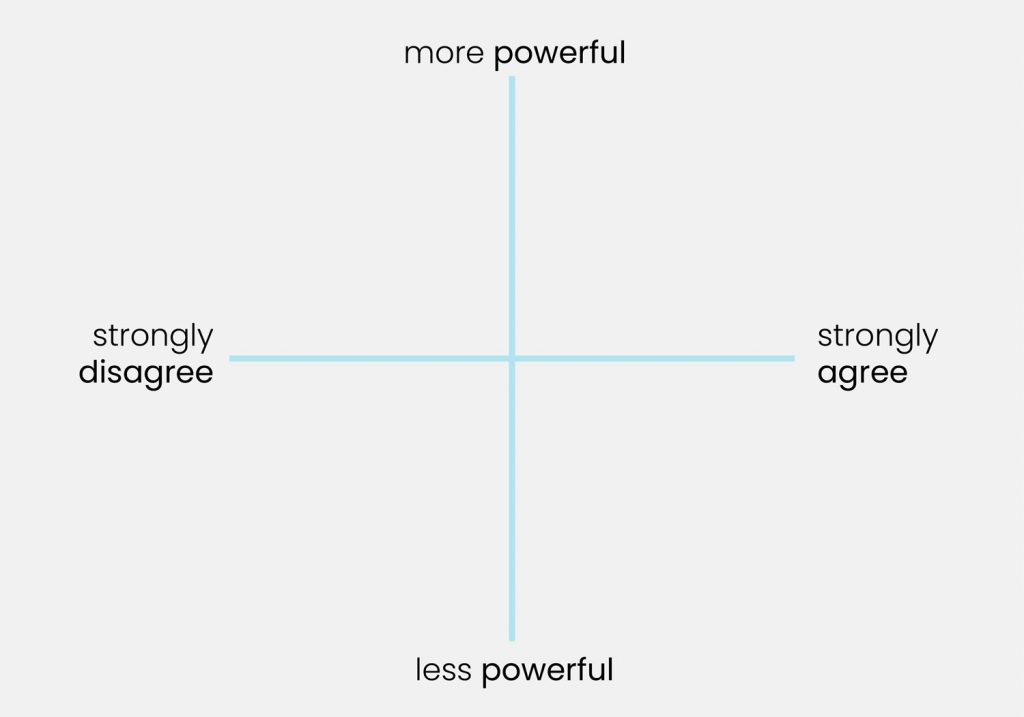
Step 2. Consider all the stakeholders in your effort to make election day different this year. Who else has a role to play? In this case, it might be your coach, athletic director, teammates, student government, even university president. Try to come up with 5-10.
Step 3. Write those people or groups out on the map in the appropriate quadrant. For example…
- Your teammates may strongly agree that you should use election day for volunteering as a team, but may not have much power in the decision making.
- Your university president may hold a lot of power, but may not know much about this issue and has neutral stance at the moment.
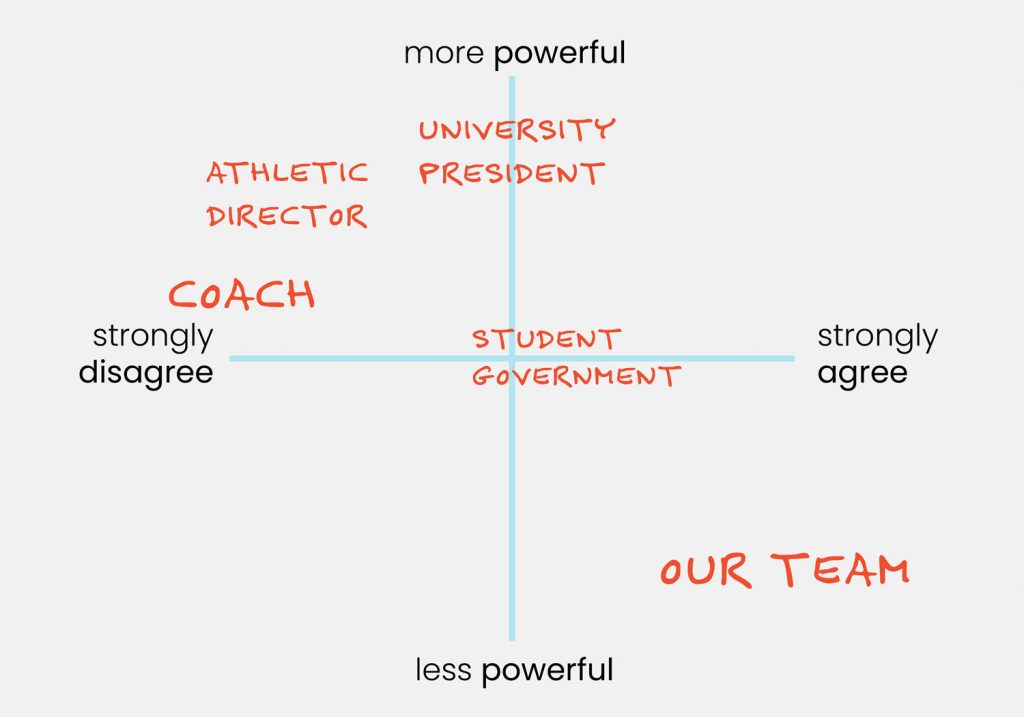
Step 4. Consider the strategies needed to move everyone to that top right corner of the chart. What would it take for you and your teammates to become more powerful? What would it take to move your university president toward strongly agreeing — and then use their power for good and influence your coach?
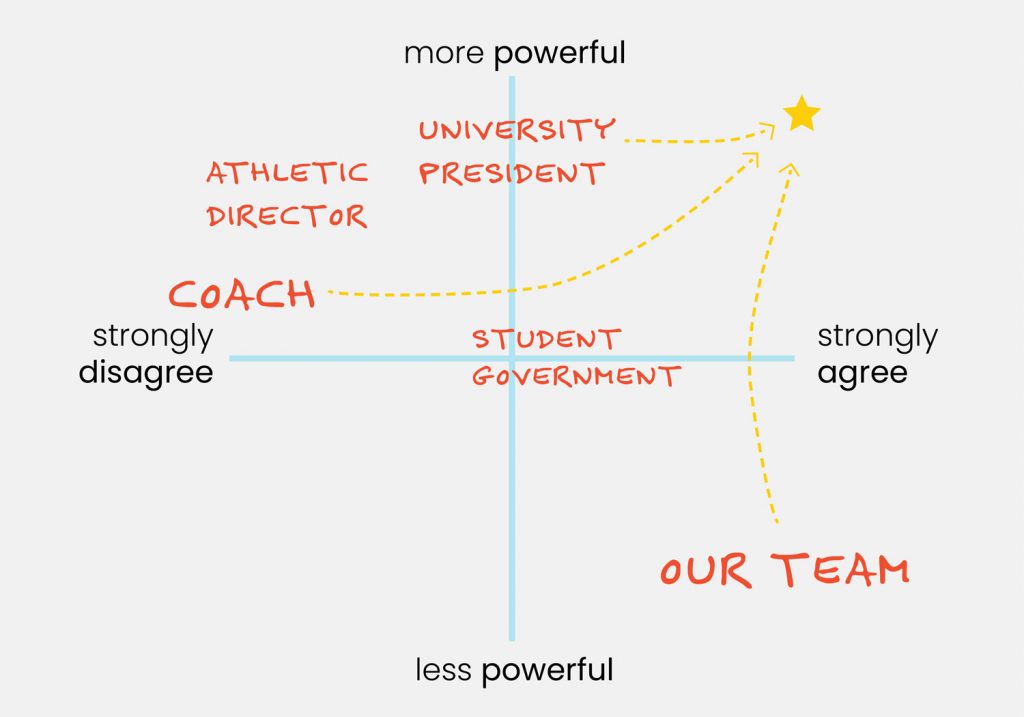
Mapping out these pathways gives you specific, practical strategies to work with. When everyone is in that top right quadrant, the change will happen!
Extra credit: read through the full power mapping article to learn more nuanced ways of using this strategy to your advantage →
#3 Refine your argument.
Now you’ve got a plan. But what are you going to say to your coach when you talk with them?
Fortunately, the Better Arguments project has laid out a fresh way of arguing for what you care about. They believe that our country doesn’t need fewer arguments, we just need better ones. If done thoughtfully, arguing doesn’t have to drive us apart but help us more deeply understand what matters and find common ground.
So, how to argue better?
- Take winning off the table. Starting from a place of curiosity and mutuality will set a good tone. When we are too demanding from the get go, it’s easy for both sides to dig our heels in even deeper.
- Prioritize relationships and listen passionately. What matters to the person on the other side of the table? How might you be able to help them achieve their goals as well? We’ll never know what we share unless we listen deeply.
- Pay attention to context. Your interaction with your coach doesn’t live in a vacuum. There’s undoubtedly history between them and your team. What needs to be mentioned or addressed? What emotions are lying beneath the surface that we need to pay attention to?
- Embrace vulnerability. Sharing about your own hopes, fears, or desires can create an open, relatable atmosphere. By opening up yourself, you can invite others at the table to share how they’re really feeling — or share something they’re worried about. Addressing these together can create more meaningful and long-lasting change.
- Make room to transform. Without trying to just “win,” you’ll find there are more benefits to engaging in deep conversation with others. It’s easier to change someone else’s mind if you’re willing to have your own mind changed.
It’s easier to change someone else’s mind if you’re willing to have your own mind changed.
Learning how to argue better lets you set the tone and pace of the conversation. This unlocks a whole world of possibilities, rather than a heated debate where neither side will budge.
Extra credit: explore the Better Arguments website additional resources →
Power to the athletes!
We know that you’re more powerful than you think — and here to help you realize that reality! By being more literate in power and mapping how it flows, you can build power out of thin air.
So, go map that power, build your argument, and be the one to catalyze a new civic ritual with your team. And once you convince your coach, make sure to share the #AllVoteNoPlay Playbook so they can run one of the many useful civic drills. And maybe next year, you’ll be the one to lead the section on building civic power.
